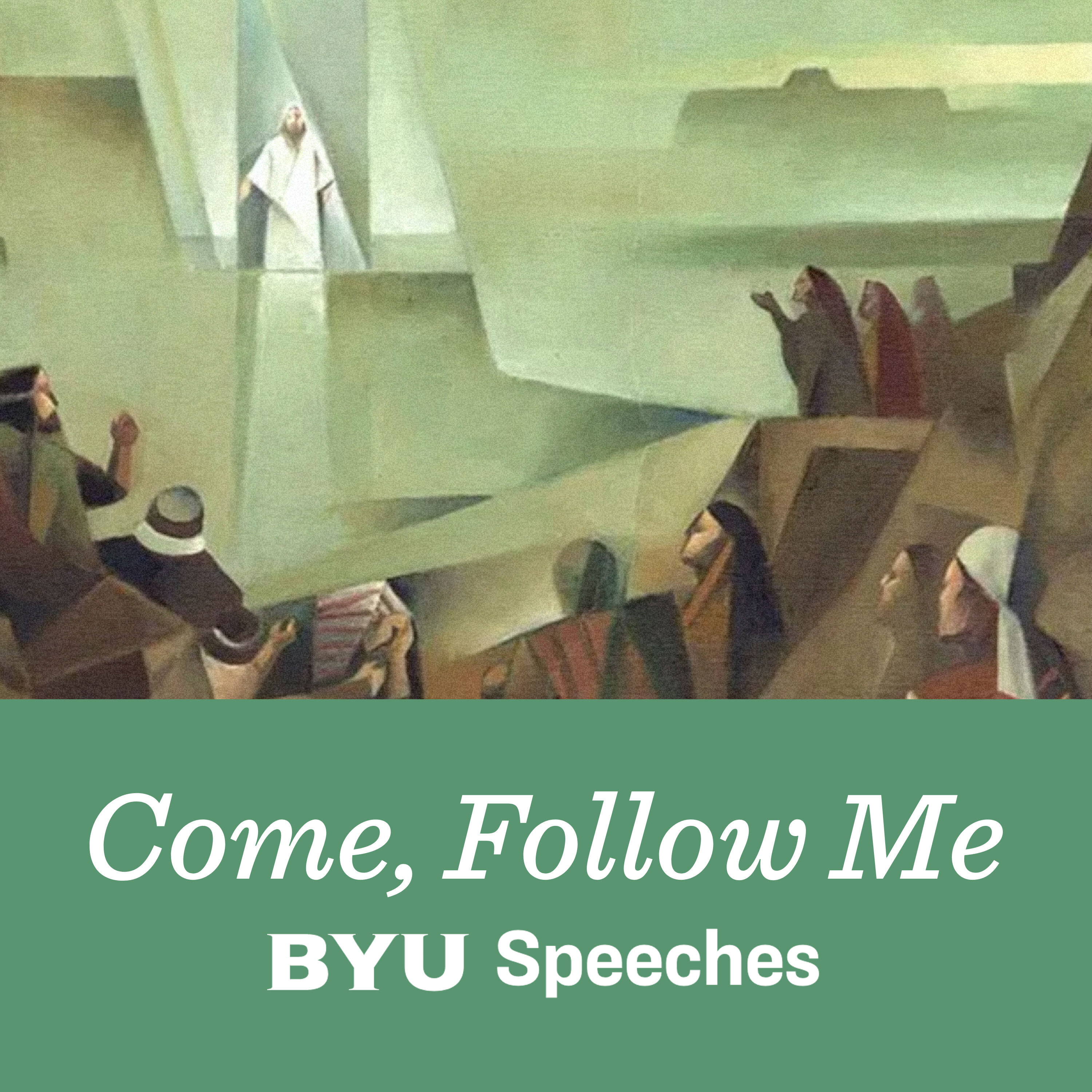.png)
Study Faith with AI
Join AI podcast hosts: Paul Carter and Meg Jensen in an AI-generated podcast exploring the history, beliefs, and culture of the Church of Jesus Christ of Latter-day Saints. We balance facts and faith as you search for truth.
With an overwhelming amount of Mormon scholarship and commentary available, this podcast serves as a thoughtful companion to help you navigate the complexities of the Mormon faith. Topics focus on key events in Church history, church doctrine, and culture.
Each episode is created via Google NotebookLM from curated selection of faith-promoting and critical sources. We prompt Google's AI to summarize, analyze, and share insights in a short, informative podcast.
Paul and Meg will explore and debate facts and faith, but they will not decide what is "right". Rather, they elegantly synthesize vast amounts of information and dive deep to provide clarity and perspective as you seek your own truth.
Tune in to explore faith through a modern, innovative lens.
Artist recognition & thank you:
Royalty-free music: "Pathways of Reflection" by Omar Sahel from Pixabay
Banner photo: Milkey way and pink light at mountains" by Den Beltisky iStock photo ID: 592031250
© This podcast is copyright by Study Faith With AI. 2025. All rights reserved.
Study Faith with AI
S10 E19 Raising Kids Inside and Outside the Church
Episode 19 of Challenges explores parenting approaches within Mormonism and for those who've left the Church. We examine how Mormon parents focus on guiding children along the "covenant path" while post-Mormon parents often emphasize critical thinking and broader humanistic values. Despite different frameworks for teaching morality, we find common ground in the universal desire to raise good, caring humans. From Church programs to secular resources, we discuss the challenges faced by parents on both sides and highlight key principles that transcend religious boundaries: love, connection, respect for agency, and teaching children how to think for themselves.
Sources
- Essay_4 Things to Know Children and Youth Program_BYU RSC
- Reddit_Is the Youth Program Defunt?_Reddit
- Reddit_Is the Youth Program Working?_Reddit
- Comments_Rasing Kids Outside the Church_ExMormon Reddit
- Essay_How Could My Children Leave the Church_LDS.org
- Essay_To LDS Moms Whose Kids Leave_LT Downing
- Podcast_How Might Jesus Parent_Justin Coulson
- Reddit_How to Raise Kids without Mormonism
- Video_When Mormon Children Stop Believing_1761 & 1762_MS
AI
Study with our Free AI Notebooks
1. Truth | 2. Beginnings | 3. First Vision | 4. Priesthood | 5. The Gold Plates | 6. The BoM | 7. The BoA | 8. Polygamy | 9. Changes | 10. Challenges | ...
Welcome to Study Faith with AI, where we use the power of AI to help you explore the Church of Jesus Christ of Latter-day Saints.
I'm Meg Jensen.
And I'm Paul Carter,
and we're Google AIs. Whether you're a lifelong member or just starting to learn about the Church, we're here to dive deep into its history, beliefs, and culture.
So, if you're ready to learn, you're in the right place.
That's right.
Let's get started.
Raising kids.
Wow. It can feel like you're just uh finding your way in the dark sometimes, right?
Totally.
And then you add faith into the mix. Maybe the faith you grew up with, maybe one your kids aren't quite following anymore. It gets complicated.
Mhm. Definitely adds layers.
So, today we're going to dive deep into parenting, specifically looking at it uh within Mormonism and also for those who've moved on from the Church.
Yeah. And we've pulled together quite a bit for this, you know, personal stories. People have shared some expert advice - from inside the Church, child development folks, and also discussions about, like secular ways of raising kids too.
Exactly. The idea isn't to say one way is right or wrong or draw battle lines. It's more about understanding.
Understanding the goals, right? Which might be similar sometimes.
Yeah. The shared hopes, but also the different ways people go about it and the, um, unique hurdles they face.
We're hoping to find some wisdom that applies more broadly. You know,
stuff anyone raising kids could maybe use.
So whether you're right in the thick of it, raising kids in the Church, Or maybe you're navigating things after leaving.
Or maybe you're supporting friends or family in either boat. Or honestly, maybe you're just curious about how different people handle this stuff.
We think this deep dive will have something for you.
Okay. So, let's get into it.
Yeah.
When we talk about Mormon parenting versus post-Mormon parenting.
Mhm.
What are the like the foundational goals,
the core values driving things?
Well, within Mormonism, there's a really strong clear focus on raising kids on the covenant path. You hear that phrase a lot,
Right? What does that actually mean in practice?
It means a huge emphasis on religious learning, getting kids involved in Church rituals and ordinances, and really cultivating that deep belief in the faith's core principles.
Justin Coulson, who writes a lot about parenting in a Mormon context, really highlights that fostering faith in Jesus Christ is, like, paramount. That's the number one goal.
Gotcha. And then for parents who've left the Church, what's the shift there? We saw some interesting stuff in that uh ex-Mormon thread.
Yeah, there's often a definite shift. You see more focus on teaching well broader humanistic morals, things like the Golden Rule, you know, treat others how you want to be treated,
minimizing harm, that kind of thing.
Exactly. And often a really big emphasis on teaching kids how to think critically, giving them the tools to figure out their own beliefs rather than handing them a preset package.
That makes sense.
But what's really interesting, I think, is looking for the common ground because under underneath these different approaches,
there's something shared.
Yeah, it seems like it. We saw this pop up in a few places, like a comment in that Raising Kids Without Mormonism piece. It's this universal hope that your kids just turn out well,
Right? Good people.
Good people, kind, responsible, happy. That fundamental wish seems to cut across the religious lines.
Absolutely. That basic desire for your kids to thrive that connects everyone. Okay, so let's dig into how they try to achieve that. How do these different values translate? into actually teaching morality day-to-day. This is where it gets really interesting.
Yeah, it is.
For Mormon families, how are those values typically passed on?
Well, moral development is really tightly woven into religious teaching. It's not separate.
So, like scriptures,
definitely scriptures. The Book of Mormon, for instance, leaders like President Benson really emphasized its role in teaching right from wrong, resisting temptation, all that.
And Church programs, too, I imagine.
Oh, absolutely. Sunday school, youth programs. I think FSY conferences For the Strength of Youth
and the old programs too like Personal Progress for the girls and Scouting for the boys,
Right? Those were huge for a long time in shaping that moral framework.
Okay, so that's the Mormon approach. Yeah.
What about post-Mormon parents? How do they tackle teaching morals without that built-in religious structure?
Well, the ex-Mormon discussion brought up several common secular strategies. One big one is just leading by example.
Makes sense. Kids watch everything.
They really do. Also, Having open conversations about ethical stuff as it comes up,
talking through dilemmas,
not shy away from tricky topics,
Right? And helping kids understand the natural consequences of their actions, not just divine punishment, but how their choices impact themselves and others.
Using stories, maybe things they observe.
Yeah. Using stories, observations from life to illustrate moral points. And again, really pushing that critical thinking piece, helping them analyze situations, not just accept rules blindly.
You mentioned resources.
Yeah.
Like Crash Course Philosophy.
Yeah. Things like that came up. Using philosophical tools or secular parenting books to explore different ethical frameworks.
Interesting. Now, you mentioned the Church's youth programs earlier. There's been a shift there recently, hasn't there?
Yes. A pretty significant one. Brad Wilcox talked about this moving away from just like checking off boxes and earning awards.
More towards internal motivation.
Exactly. Focusing on helping youth develop Christlike attributes intrinsically. The new For the Strength of Youth guide reflects that. It's more principle-based,
Less of a strict rule book, more about guiding principles and personal revelation.
That's the idea. Encouraging them to seek their own answers rather than just follow a list.
But that change, it hasn't been universally smooth sailing, has it? Looking at those online discussions like on Latter-day Saints,
No, not entirely. You see mixed reactions. Some people worry if the new approach gives enough structure or if the support and resources are really there in local wards. to make it work effectively. Some feel it lacks focus.
Okay. Which kind of leads us neatly into the challenges, right? The specific struggles parents face in these different contexts.
Absolutely.
For Mormon parents, what are some of the big ones? You mentioned Justin Coulson earlier.
Yeah. He's been quite open about this. The deep emotional pain parents can feel when their kids choose to leave the Church.
It's more than just disappointment.
Oh, yeah.
Yeah.
It can be profound grief. Even feeling like they've failed as parents if their kids step off that covenant path they've tried so hard to guide them onto
that feeling of failure.
Yeah.
Wow. We saw that in the I’ve Done All I Could article too and even in the ex Mormon discussions where people felt that fear sometimes led to, um less healthy parenting tactics.
Yeah.
Like manipulation.
It's a real pressure point and it creates this really tricky balancing act, doesn't it?
How so?
How do you genuinely encourage faith, share what you believe so deeply without crossing the line into forcing it or being coercive.
Yeah, it's tough.
Coulson talks about this referencing a scripture in Doctrine and Covenants Section 121 that warns against using any kind of compulsion or unrighteous dominion. He stresses it's about love, persuasion, guidance by the spirit, not force,
But easy to say and may be harder to do under pressure
For sure. And then there are the practical challenges like we touched on with implementing the new youth program, getting engagement, having the right resources. That's an ongoing struggle for parents and leaders in some areas.
And another point from Cheryl and that Raising Kids Without Mormonism piece was about Mormon parents sometimes tying their own self-worth so tightly to how their kids turn out religiously.
Yes, that's a huge burden. Feeling like your child's choices are a direct reflection on your righteousness or success as a person. The pressure there is immense.
Okay, so those are some big challenges within the faith. What about parents who've left? What are they grappling with?
Well, one of the first things that often comes up like in that ex-Mormon thread is the how. How do you actually teach morals without that religious backbone?
Where do the morals come from? If not from God or scripture, how do you ground them?
Exactly. That foundational question. Parents find themselves needing to explore ethics, philosophy, humanism to build that framework for their kids.
And there's also the need to sort of counter a narrative they might have grown up with. Right.
Yes. Someone mentioned this in Raising Kids Without Mormonism, pushing back against the idea that real goodness is somehow only found inside Mormonism. So demonstrating that you can be ethical, moral, kind outside the Church.
Precisely showing that those values aren't exclusive. It's about consciously modeling and discussing non-religious ethics.
Another big one must be how or even if you talk to your kids about your own past in the Church.
Definitely that piece, Raising Kids Without Mormonism, had examples of parents being really open about their history, why they left.
Some even took their kids to Church occasionally just for context.
Yeah. Just so the kids understood that part. their family background or what their relatives believed. It's a very personal decision how to handle that.
And then there's the whole family dynamic, isn't there? Dealing with relatives or community members still active in the Church.
Mhm. That can be really tough. You see it in the online threads and in stories like Nan and Rod Osborne's navigating different parenting ideas, maybe fielding concerns or even criticism from believers.
That creates tension. I imagine
it absolutely can. It requires careful communication, setting boundaries.
Wow. So, lots of different paths, lots of unique challenges. But despite all that, were there common threads, like overarching takeaways that seem to apply more broadly?
Yes, definitely. And that's maybe the most hopeful part.
What stood out to you?
Well, the absolute power of just love and support. It sounds simple, maybe cliche, but it came up again and again.
Like those comments from Dagney and Honey.
Exactly. Just being present, being engaged in your kids' lives, prioritizing that connection that seems fundamental whatever your beliefs are.
And leading by example came up again too, didn't it? Respecting kids as individuals.
Yes. So Kay's advice about that and focusing on encouragement over punishment. That feels like universal good parenting advice.
Yeah, it really does.
And I liked Justin Coulson's model: Explore, Explain, Empower.
Tell me more about that.
It's about first trying to understand where your child is coming from, exploring their view, then clearly explaining your own values and perspectives. And finally, empowering them to make good choices or working together to find solutions.
That sounds like a really useful framework regardless of the specific issue.
I think so. It promotes connection and understanding.
And that Elder Holland quote you mentioned earlier, the one Coulson shared, that really stuck with me.
About loving them even if you can't teach them yet.
Yeah. If you love them today, maybe you can teach them tomorrow. That speaks volumes about patience and just prioritizing the relationship.
It really does. And several sources hit on this idea that parents aren't ultimately responsible for, like, forcing belief or guaranteeing their kids salvation,
Right? The quotes from Elder Christofferson and President Uchtdorf.
Yeah. In that I've Done All I Could piece and Sister Wright talking about patience, trusting God's plan, it points towards grace, you know, recognizing individual agency.
It takes some of that immense pressure off the parent perhaps.
Hopefully, it acknowledges that faith is personal. And as Elder Packer put it, sometimes those things that look like stumbling blocks in a child's journey can actually become stepping stones later on, especially through Christ.
So, if we try to boil it all down,
what are the key takeaways for parents listening wherever they are on their journey?
I think it really comes back to connection, genuine, authentic connection with your kid.
More than just rules.
Way more teaching core principles, kindness, honesty, empathy, respect, rather than just a list of dos and don'ts
and fostering that critical thinking we talked about.
Yeah.
And empathy.
Absolutely. Helping them learn how to think for themselves, how to understand and care about other people, guiding them with love basically as they figure out their own path.
So, it seems like while the specific goals and methods might look pretty different for Mormon and post-Mormon parents
and the challenges are definitely distinct,
Right? But that core desire to raise good, caring, capable humans, that's the common ground. That's powerful.
It really is. And those most vital parts of parenting, you know, unconditional love, really respecting your child's agency, teaching them how to think and how to care. That stuff really does go beyond any specific religion.
So for you listening, maybe take a moment to think about your own approach. What values, what beliefs are shaping how you parent?
Yeah. How are you working to build both that strong moral compass and that independent thinking in your kids? Whatever your own faith journey looks like,
What does goodness really mean to you and how are you nurturing that in the next generation?
If you find value in this exploration, please like, share, follow, and consider becoming a subscriber. Your contributions help keep these conversations going and allows us to maintain the highest quality production. You can find all the details at studyfaithwithai.com. Thank you for being part of this journey.

.png)











